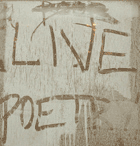(May 2005) Have been re-reading Bill Moyers’ interview with Joy Harjo, who is interested in how our linguistic choices reflect our separation from the natural world and thwart connection. Our manufactured separations, she says, make it difficult for us to create a home for ourselves in the world and increase the likelihood that future generations will, like Shrub and Reagan, view nature as a compilation of resources to be plundered.
I study connection, contemplate how it might build bridges, because that, to me, is what good art does: it speaks across great distances and shows us our universality, our connections.
We use symbols, art, magic, pain—whatever works (and it all does)—to capture something that’s on the tip of everyone’s tongues (if we listen). We articulate what we recognize at a subconscious level, bring it out into the open and examine it.
This can build a bridge, create a connection with someone with whom we have no apparent connection, and thereby remind us that we’re all a part of the same big whole.
Harjo notes that these are “difficult times when the illusion of separation among peoples has become so clear.”
Moyer: You said “illusion.”
Because I think it is an illusion. I think this is more the shadow world than it is the real world.
Moyer: This world of alienation and of separation is the shadow world?
Yes, but this shadow world is also very real. There are many wars going on all over the world and each of them is very real, and the losses people suffer because of them are very real. I don’t mean to deny that at all.
Moyer: And yet there is something underneath that the artist sees?
Yes, but I think artists always have to include what’s apparent and real in that vision, even while we’re always searching for what makes sense beyond the world.
So, basically, she is simultaneously asserting that these separations are an illusion while acknowledging that they exist (gulp).
This is consistent with her poetry.
Europeans/Americans are separated from everything around us in Harjo's world. And we did this to ourselves. We're a sad collection of postlapsarian characters who stick our flags down into land and women and poor countries and whatnot, insisting that these things are MINE MINE MINE. Yet, in her big picture, we're all interrelated.
She also says that, since nothing exists, we are not really separate at all.
Bear with me.
Harjo's ultimate point is that we are not separate from the natural world at all, despite our insistence to the contrary. We exist in nature and its processes not as unique beings, but as one undifferentiated aspect of everything else. Even if we designed those clever little hierarchical structures and created that elaborate Great Chain of Being theory and the Judeo-Christian creator who defined us as separate, superior, the ones who name and have dominion over everything.
We’re related to everything, folks. We're interconnected and dependent, just one human mushroom in a giant steaming stew.
What strikes me most about this interview is that, when you think about it, Harjo has (as J. Scott Bryson noted before me) managed to have her ontological cake and eat it too. What she’s positing is that we’re all in relationship with nature but that we’re also separate from it, and by choice.
I make an obscure leap from that realization to folks with victim complexes, because this seems like another way that we humans create and maintain alienation, isolation, disconnection that we wind up propping up around us as protection.
Gotta ponder that one some more though and see if I can do something with it.
So think about it. We create the illusion of alienation from our environment and then this illusion creates actual alienation from our world and comes to defines us.
I don’t always feel a connection to people, but do always feel one to the natural world, and especially to water. Maybe that’s why I like Mary Oliver’s writing so much.
Oliver may be somewhat of a one-trick pony (as a poet recently announced to me), but she walks in the woods the same way that I walk in the woods and I feel that recognition in every one of her lines.
LISTENING TO: PARIS La Belle Époque: The Music of Gabriel Fauré, César Franck, Jules Massenet, and Camille Saint-Saëns, performed by Yo-Yo Ma and Kathryn Stott, currently Massenet’s “Méditation” from Thaïs. It’s very beautiful, especially when I stare into an orchid bloom and listen to that cello.
READING: still reading Carol Guess’s Switch and wish I had a block of time big enough to read the rest in one sitting. I like her awareness of working-class choices but wish some of her sentences were a little different.
SANG IN SHOWER: All right, I don’t know where these things come from, but this song came out long, long ago when I was maybe 10 years old and is now running through my head: It’s called “Daddy, Don’t You Walk So Fast” and I have no clue who sang it, but it’s running all ‘round in my brain.
BEST-OF SPAM SUBJECT LINES: Shed inches in minutes • It doesn’t hurt to check Alana


No comments:
Post a Comment